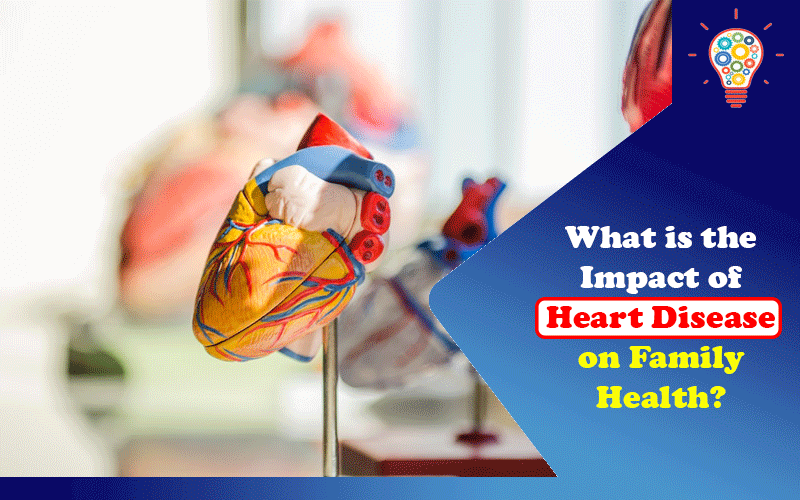What if your grandmother had heart disease? Or your brother is experiencing a high cholesterol level? Maybe your mum or dad has high blood pressure. And perhaps one of your closest relatives has coronary heart disease. Most probably, the natural question would be, “Will you be the next victim of heart disease?
Well, the truth is having a family history of heart conditions can put you at a higher risk for developing heart disease. However, everyone’s situations are different, and some heart conditions may be genetic and hereditary. In contrast, others would be a result of existing family lifestyles.
Lucky for you, we’ve explored the impact of heart disease on your family health, both for lifestyles and hereditary or genetic situations. But first, let’s discuss how family history would affect your health, plus how it’s a risk factor for your heart health.
Table of Contents
What does a family history of heart disease entail?
Having a family history of heart conditions means that a member of your family has or had heart disease. However, having a history does not necessarily mean that you have a direct ticket to a heart condition. But it does increase your chances of developing heart conditions affecting your family member.
The good news is even if you have a history of heart diseases, there are numerous ways in which you can help lower your chances of developing the conditions. And that’s why you must read this article to the end.
For now, let’s learn more about how your family history affects your health.
Impacts of heart disease on family health
Your family history can increase your risk of heart disease. And this can happen through:
a) Genetic and hereditary risk conditions.
There might have been a time or situation when people identified you with either of your parent’s values, skills, height, or body size. What I mean is, sometimes we take or pick up a lot of things from our parents.
We inherit features, values, skills, and critical things on how our bodies function or work. Some of which can be passed down from one generation to the other.
But how does the hereditary happen?
The critical property of any living organism is its ability to reproduce. So, most organisms would inherit genes that specify their structures and body functions from their parents. In other words, the inherited faulty genes are among the risk factors of heart conditions and can affect how you look and how your body works.
That said, here are some common inherited risk conditions:
- Cardiomyopathies-heart muscle disease
- Channelopathies-life threatening heart rhythms
- High blood pressure
- Hypercholesterolemia-high cholesterol levels
Suppose your family had a history of heart and circulatory diseases. Your chances of developing such conditions would be high.
b) Family lifestyle factors
Your risks of heart conditions are not entirely based on your family’s genetic makeup. But can be a combination of several factors like:
- Your family dietary preferences may or may not increase your risk of heart conditions.
- Habits and attitudes like presence or absence of regular exercise
- The circumstances or environment you’re raised in
In a nutshell, here is how family history increases your chances of heart disease:
Inherited genes– Of course, there are no specific genes causing heart conditions. But several genes may function together to pass on the risk of high blood pressure which is accomplices to heart conditions.
Shared environments– chances are high that your risk of heart conditions can be passed on through common shared conditions. You can develop particular lifestyle behavior and eating habits like your preference for a specific diet that isn’t healthy for your heart.
What should you do if you have a family history of heart condition?
Unfortunately, you can never control your family genes. Some of these diseases are expensive so it’s always important to have your family doctor understand some of these conditions are genetically linked. This will help them check your blood pressure and cholesterol levels- all of which contribute to your risk of heart disease.
Likewise, you can help reduce your chances of developing heart conditions if your family member has or had heart disease. In other words, your future behaviors would play a big part in managing your heart health. Therefore, adopt positive lifestyle habits that would help lower your risk. These may include:
- Make healthy food choices- remember you can achieve optimal heart health through your diet.
- Do more regular exercises to lessen your heart complications
- Cut your weight- being overweight increases your chances of developing heart-related conditions like high blood pressure
- Strive for healthy mental hygiene- a life free from stress, depression, or anxieties
- Manage your blood pressure and cholesterol levels
Conclusion
Your family history of heart-related conditions can increase your chances of developing heart disease. Well, it’s not a guarantee that if your family member has or had heart disease, you must have it. No, it only increases your risk of having the conditions but the good thing is you can always prevent or control the risks.
Unless the heart condition is in your genes, you can always ensure you make the right choices of foods. Also, maintain regular exercises while watching your body weight, and managing your blood pressure and cholesterol levels to help you live a healthy heart life.
Read Also: Effective Ways to Improve Heart Health

